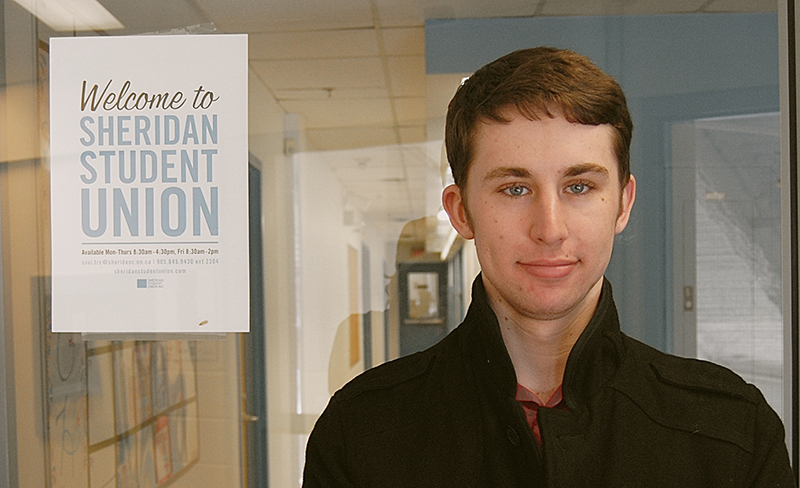STORY BY SPENCER LUYBEN
The newly elected members of the Student Union already seem to be on the same page.
First-year Photography student Megan Ritchie, second-year Print Journalism student Alec Wheeler and second-year Computer Systems Technology–Software Development student Russel Neal will comprise the 2014-15 board of directors at Trafalgar Campus.
The students were voted in on March 21 and each of their campaigns – encompassing a multitude of platforms – contained three identical objectives: continued focus on strengthening security around campus, the extension of hours of operation at the cafeteria and a more efficient communication system between the student body and the Student Union.
Increasing the amount of security patrols around the trails on the perimeter the campus is something the Student Union focused heavily on this past year in light of the sexual assault incidents.
“We have two security vehicles that drive around campus, but I feel like they need to drive around the forest a lot more than they actually do,” said 18-year-old Ritchie. “A lot of students have to travel through it and it’s really dark at night.”
Ritchie suggests installing “lights throughout the forest” to deter potential assailants and instill comfort in students using its pathways during late hours.
The late hours students spend on campus ignited another proposal from the new team: extended hours of operation at the cafeteria.
“I’m advocating that it should be open more often than just Monday to Friday,” said 21-year-old Wheeler.
He says the focus is to accommodate students who “have weekend or late night classes” during times where even Tim Hortons is closed, rendering all on-campus options unavailable.
For people who live in residence like Ritchie, it’s a constant issue.
“There are people who don’t really know how to cook that live in res,” said Ritchie. “So if it were open [on weekends] they could go in and grab something.”
Neal agrees with the idea of elongating hours, but is hesitant to make concrete promises.
“It’s not open late enough,” said Neal. “I know that’s not directly in my power [to change]. It might be something that becomes a petition.”
What is in their power, however, is creating a more effective and efficient communication system with students, and Ritchie believes the first step toward that is becoming more accessible.
“We’re not really in the school right now,” she said in reference to the Student Union office’s obscure location.
Ritchie says many students don’t even set foot in the building where the offices are located, so she’s backing an idea that would create a Student Union office in a more centralized area.
“The most trafficked area is by the Tim Hortons between the bookstore and the cafeteria,” said Ritchie, who believes that area of the campus would be an ideal spot for an office.
“We would be more accessible, we could get students to come in and talk to us in person, and it would just be easier for them [to voice their concerns].”
Wheeler seems to be in lockstep with the notion of open communication, but is planning a different strategy.
Wheeler said communicating with students was critical in the campaigning process, but after being elected it’s even more important.
“It shouldn’t end just because we won. It should continue onward.”
He frequently uses his Facebook and Twitter pages to suggest ideas to students and measures their responses. He suggests that all members of the board of directors should do the same, if they aren’t already.
The new board will attend a retreat in May to familiarize themselves with policies before implementing their ideas next year.
